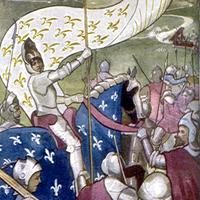11. The Armies of the North
"See ye the banners blazoned to the day, Inwrought with emblems of barbaric pride? " —SHELLEY. Rome was dying. But by her death other nations were to spring into existence and accomplish their part in the great history of the world. Outside the bounds of the world-empire were many countries still plunged in a shadow-land such as Greece and Rome had once been in the long ago days of which we have learnt.
Away on the far banks of the frozen Danube lived hordes of wild barbarians, known as the Goths. They were tall, fair, strong, and brave men. Living on the borders of the Roman Empire, too, they had learnt Roman ways. Some of their young men fought in the Roman army, some had become Christians; and a Gothic translation of the Gospels may still be seen in Sweden, their early home, written on purple vellum in silver letters.
But some thirteen years after the death of Constantine a great change took place in the position of the Goths.
Suddenly a horde of squalid savages appeared from the wild regions of Central Asia: each man was short and fierce looking, each rode a pony as ugly and unkempt as himself. They were the terrible Huns, who had fought their way over the high tablelands of Asia till they reached the Sea of Azov and found the land of the Goths. On rolled the flood of invaders, striking terror before them, conquering the lands of the Goths, pressing ever on and on toward the Danube, the great Roman boundary.
Dreading the fate that awaited them, the Goths looked across the broad Danube with its well-tilled plains beyond; and at last they crossed over. Day after day and night after night ships crossed and recrossed the Danube, till thousands of Gothic warriors with their wives and children stood on the soil of the Roman Empire, while the watchfires of the Huns blazed away behind them on the other side of the river.
They had made a compact with the Romans before they had taken the important move; but very soon that compact was broken, and a few years' time found the Goths and Romans at war. Under their young king Alaric they prepared for battle, determined to cut themselves loose from the old and decaying empire, and to hew out new realms for themselves with their own trusty broadswords. A striking army they must have made, with their tall strong figures, their long curling hair and beards, their short girdled tunics with wide turn-down collars and short sleeves, the long trousers which contrasted strangely with the bare-legged Romans.
Leaving Constantinople on their left, the Goths overran the open country of Macedonia. There was no Alexander the Great to oppose them. They passed through the narrow defile of Thermopylæ, but there was no Leonidas and his Spartan Three Hundred to hold the pass against them. All over the sacred places of Grecian story—Corinth, Argos, Sparta—the tall barbarians swarmed. Athens alone escaped, because, says an old story, Alaric saw the goddess Athene going round about the towers of the Acropolis and Achilles the hero wrathfully guarding the walls.
His thoughts now turned westward. Constantinople was matchless in its strength, Rome was pitiable in her weakness.
"Alaric, delay not; thou shalt penetrate to the city," said an unknown voice ever in his ear. In the year 400 he obeyed the mysterious summons and entered Italy. Slowly he crossed the snowy Alps, the women and children in Gothic waggons, the warriors on their war-horses, Alaric himself probably full of schemes for the future when he had "penetrated to the city. " But this time he was driven back, and he had to wait ten years before he could accomplish his cherished ideal.
His next march over the north of Italy was like a triumphal procession. He plundered city after city, till at last he came to the walls of Rome. He had already cut off the food-supply of the city by possessing himself of the Port of Rome, so that the great ships from Alexandria could no longer supply grain for the capital. He then waited till hunger and pestilence drove the senators to sue for peace. They begged for honourable terms, for they would rather die than yield.
"The thicker the grass, the easier it is to mow," was Alaric's heartless answer. He must receive all the gold and silver within the walls, and all the foreign slaves, before he granted peace.
"What do you leave us then?" the senators asked.
"Your lives," replied the barbarian conqueror. It was the 24th of August 410, when at last Alaric and his Gothic army passed through the gates of Rome. It was over eight hundred years since the wild Gauls had slain the old fathers in the Forum, eight hundred years since a foreign foe had set foot in the "Eternal City. " Terrible were the sufferings of the Romans during the six days that the Goths pillaged their once famous city. The news was carried to the feeble-minded emperor, who had long ago escaped from Rome and was keeping poultry in the country.
He had called his hens by names, and one was known as "Rome. " "Rome has perished," cried the messenger, hastening into the presence of the young emperor. "That cannot be, for I have just fed her out of my hand," cried the distressed poultry-keeper. Then the messenger explained that it was the city and not the hen, which seemed almost a relief to the emperor, as he murmured, "But I thought, my friend, that my bird 'Rome' had perished. " Such was the capture of Rome by barbarian hordes. By her fall other nations were to rise, for the civilisation she had taught was to spread through these very barbarians even to the ends of Europe.

